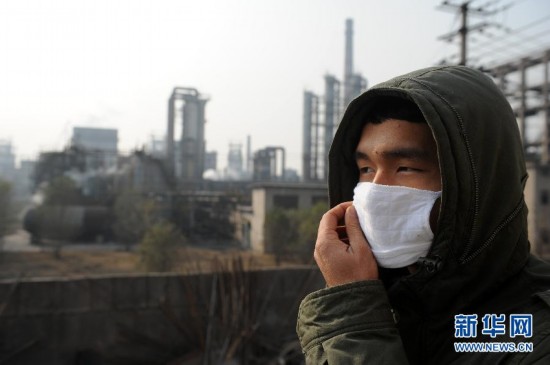Weak enforcement hinders China's pollution-cutting efforts
china.org.cn / chinagate.cn by Gong Yingchun, September 1, 2014 Adjust font size:
Inadequate law enforcement is undermining China's pollution reduction efforts despite the fact that it has laid out strict laws to prevent and curb air, water and soil pollution, said Ma Jun, director of Beijing-based Institute of Public and Environmental Affairs (IPE), at a forum held in Beijing last week.
 |
|
Inadequate law enforcement is undermining China's pollution reduction efforts despite the fact that it has laid out strict laws to prevent and curb air, water and soil pollution. [Photo/Xinhua] |
Ma said, China has advanced technology and sufficient funding to deal with its pollution problems, but it lacks the "impetus," due to insufficient public supervision, which is the primary obstacle to reducing pollution.
He pointed out that the public participation is crucial to the prevention of environmental pollution, as the public can exert pressure on local governments and pollution-prone corporations.
Real-time information disclosure of pollution sources is the key to ensuring public access to environmental supervision, Ma added.
According to Ma, China has spent large amounts of money installing online pollution monitoring equipment for almost 10,000 high-polluting corporations over the past 15 years due to their lack of honesty in pollution reporting. However, the monitoring data are only open to environmental bureaus not to the public.
"Some local governments always intervene to protect polluters when environmental bureaus want to punish them," Ma said. "If the data about pollution sources are revealed to the public, even data that have been tampered with, it will increase the risk in local government interventions, thus forcing them to strengthen their law enforcement," Ma explained.
In June, the IPE released a pollution map application for smartphone users in a bid to enable people to check data about air quality and pollutants in 190 Chinese cities. The app allows users to search and share real-time monitoring data of pollution sources, and even connects pollutants and polluters together. If a company emits excessive amounts of pollutants, the public can share its performance on social networks to "shame" it.
After the release of the "pollution map" app, a total of 65 major polluting enterprises vowed to rectify their emissions violations, including electric power, steel, cement and petrochemical factories, Ma said.
Ma added that public supervision can force local governments to give up regional protection and reduce emissions and sewage discharges, while real-time information disclosure is the prerequisite.
Many NGOs are working with local governments to push forward real-time disclosures of pollution sources. "At present, Shandong, Zhejiang, Shaanxi, Inner Mongolia, Xinjiang, Ningxia and Guangxi have established such disclosure systems. This is really a global breakthrough," Ma said.
"I hope that Chinese people will work together to push forward environmental pollution prevention and control, and build a beautiful homeland with blue sky and clean water," he said.

